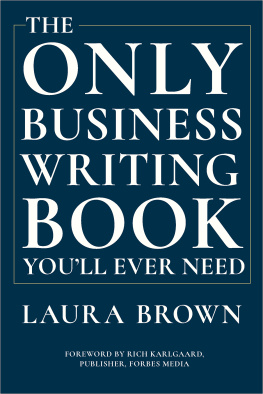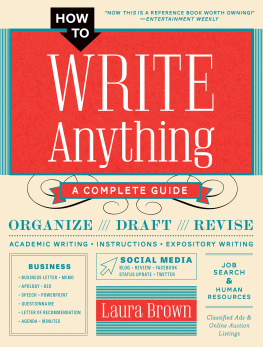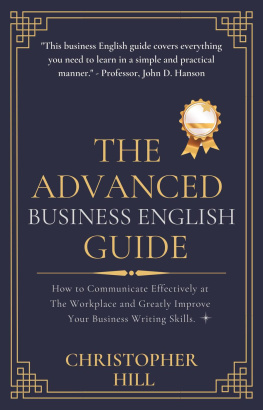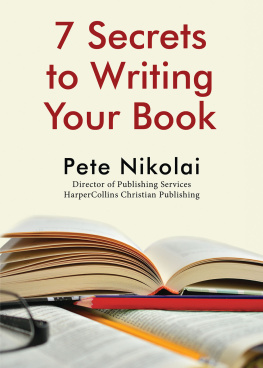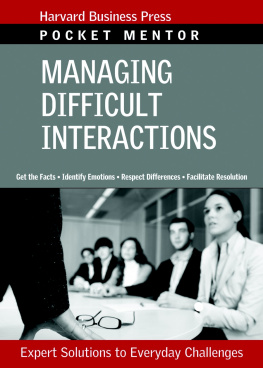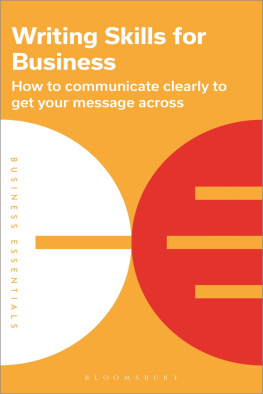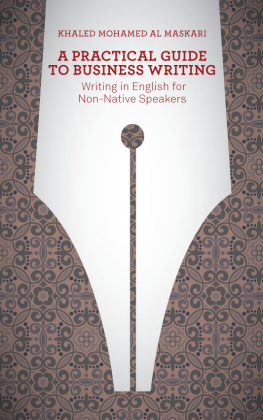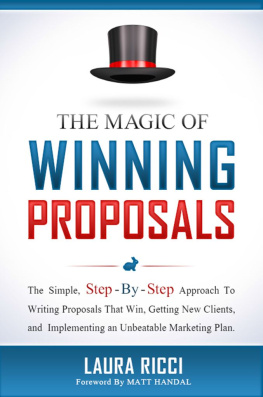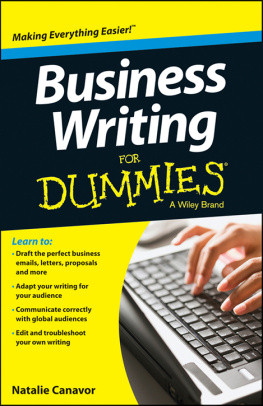The Only Business Writing Book Youll Ever Need
Laura Brown
Foreword by Rich Karlgaard

This book is intended as a guide to business writing; it is not a substitute for legal or professional advice. References to specific products, services, service providers and/or organizations are for illustration only. Neither the publisher nor the author can guarantee that any particular practice or resource will be useful or appropriate to the reader. Web addresses appearing in this book reflect existing links as of the date of first publication. The Publisher is not responsible for, and should not be deemed to endorse or recommend, any website other than its own or any content available on the internet (including, without limitation, any website, blog page, or information page to which the reader may be referred) that is not created and maintained by W. W. Norton.
Copyright 2019 by Laura Brown
Foreword copyright 2019 by Rich Karlgaard
All rights reserved
First Edition
For information about permission to reproduce selections from this book, write to Permissions, W. W. Norton & Company, Inc., 500 Fifth Avenue, New York, NY 10110
For information about special discounts for bulk purchases, please contact W. W. Norton Special Sales at specialsales@wwnorton.com or 800-233-4830
Book design by Lovedog Studio
Production manager: Julia Druskin
The Library of Congress has cataloged the printed edition as follows:
Names: Brown, Laura, 1959 author.
Title: The only business writing book youll ever need / Laura Brown ; foreword by Rich Karlgaard.
Description: First Edition. | New York : W. W. Norton & Company, [2019] | Includes index.
Identifiers: LCCN 2018046418 | ISBN 9780393635324 (hardcover)
Subjects: LCSH: Business writing.
Classification: LCC HF5718.3 .B765 2019 | DDC 808.06/665dc23
LC record available at https://lccn.loc.gov/2018046418
ISBN: 978-0-39363-533-1 (ebk.)
W. W. Norton & Company, Inc., 500 Fifth Avenue, New York, N.Y. 10110
www.wwnorton.com
W. W. Norton & Company Ltd., 15 Carlisle Street, London W1D 3BS
This book is dedicated to my teacher
Catherine M. Rose
Contents
I fell in love with snappy writing in high school, and no thanks to my English literature classes. Credit goes to a birthday gift of a Sports Illustrated subscription. Back in the 1970s and 1980s, SI magazine had a stable of top sportswriters, among them Dan Jenkins (college football and golf), Anita Verschoth (Olympic sports), and Frank Deford, in my opinion the best profile writer of the last fifty years.
I always wondered why these writers, and others of my favorites, were able to do what they did. Why was Tom Wolfes The Right Stuff so gripping that the reader felt physically propelled like the astronauts? Why was dialogue so true in the novels of Elmore Leonard, Carl Hiaasen, and John Sandford?
Later I had the privilege of working with Tom Wolfe. While the editor of a futurist magazine, Forbes ASAP , I assigned Wolfe a five-hundred-word piece on the 1990s Internet bubble. He agreed to write it, and then weeks later, on a Saturday, I happened to be standing by the office fax machine. (Remember those?) The fax started its hiss and screech, then spat out fifty-eight pages of triple-spaced copy evidently written on a typewriter. It was Wolfes draft, and it was nine thousand words long.
Why triple-spaced? I would soon find out.
During the next few weeks, Wolfe sent revisions to his triple-spaced draft. Some of his revisions were typewritten and looked to be Scotch-taped over the original text. Other revisions were handwritten and appeared as exclamation points and even, oddly, musical notes.
What I learned through the Tom Wolfe project was that Wolfe was a very good first-draft writer. No surprise there. But he became Tom Wolfe as we knew him, with his singular and unparalleled prose style, only through revision. And the revision was about craft. Tom Wolfe, great American prose stylist, was a master craftsman.
The craft of writing is wildly underappreciated. Many people mistakenly think great writing is a product of talent, but Id say its one-third talent, two-thirds craft. The three jobs of any writer are to be read, understood, and remembered. Smart craft alone is enough to accomplish the first two. Whether youll be remembered is a matter of your talent, passion, and point of view. But if your craft is poor and you write gummed-up sentences and incoherent paragraphs, no one but your cat will care about your passion and POV.
To anyone who wants to be readable, understandable, and memorable in their writing I recommend a few classics, such as Stephen Kings On Writing: A Memoir of the Craft and George Orwells Why I Write . These will disabuse you of the temptation to ever be dull, obtuse, wishy-washy, or clichd again. Another useful exercise is to retype favorite passages from your favorite writers. That and just writea lot. Bank those ten thousand hours. Such practice will earn you a bachelors degree in the craft of writing.
But you cant stop there, because now its time to get your MBA in prose. For that I enthusiastically recommend Laura Browns The Only Business Writing Book Youll Ever Need . Lord, does the world need Lauras book! If you think the need for clear, crisp writing is outdated, youre not paying attention. The richest person in the world, Jeff Bezos of Amazon, begins his staff meetings with everyone silently reading the Bezos-assigned memo of the day. Would you like to be the writer of that memo? You think you might be under a wee bit of pressure to make yourself clear, credible, and persuasive? Ya think?
As Laura perceptively notes, all business writing is an ask of some kind. Your ask is a meeting, a sale, money to hire someone, or legal help to justify a sacking. All business writing, whether text, e-mail, or memo, is an ask. Your success in business is predicated upon getting people to say yes to your asks. Business writing, you see, is high-stakes writing.
Go ahead. Be muddled, obtuse, and clichd in your business writing if you want. I can almost guarantee you wont get anywhere useful. Learn to write right, and start with this book.
Rich Karlgaard
Publisher and futurist, Forbes Media
Author, Late Bloomers: The Power of Patience in a World Obsessed with Early Achievement
Over the past thirty years, my clients have often asked me to recommend a good book about business writing. My first book, How to Write Anything , is nearly six hundred pages long and contains a lot of information about writing for school and writing in your personal life, so its not the kind of handbook my clients were looking for. I havent been able to find another business writing book I would recommend wholeheartedly, so Ive written my own.
Most business writing books on the market are too long, too academic, and out-of-date. Many of them still treat e-mail as a newfangled thing. Many of them sound like they were written by English professors rather than by people who work in an office.
Business writing has changed tremendously over the past few decades, and it continues to change rapidly. At the same time, writing is becoming more important in business. Were all writing more at work than ever before. The advent of the Internet, with the explosion of e-mail and mobile communication, coupled with globalization and virtual teaming, means that writing is the primary form of communication in many work settings. If you cant write well, your chances for success are limited.

